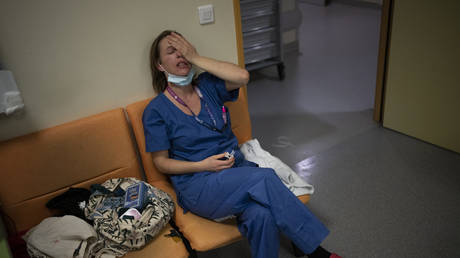Germany unveils looming Covid restrictions
Germany is set to maintain its basic Covid restrictions, including mask mandates, but will give states the power to bring tougher measures

Germany unveils looming Covid restrictions

The German government has outlined its Covid-19 restrictions for the coming fall and winter seasons, including masking requirements in hospitals and other public spaces, while authorizing local officials to take stronger action.
Announced by the Health and Justice ministries on Wednesday, the draft plan mandates masks in healthcare settings such as hospitals and nursing homes, as well as for those making long-distance trips by bus or train. With exceptions for the vaccinated, visitors at hospitals and similar facilities will also be required to present a negative coronavirus test to gain access.
Additional restrictions will depend on the severity of local outbreaks, with Germany’s 16 states authorized to impose a variety of “more extensive” regulations. Those include masking rules on public transit, indoor public events and in schools for students fifth grade and older, as well as compulsory testing at certain public places.
If officials determine the pandemic poses a “concrete danger to the functionality of the health system,” they may impose even stronger measures, such as outdoor mask mandates and social-distancing requirements, capacity limits for indoor spaces and stricter sanitation rules for businesses.
“If the number of cases rises sharply – masks [can also be enforced] outdoors where distances are not sufficient, and upper [visitor] limits indoors,” Health Minister Karl Lauterbach said in announcing the new rules.
While the draft still must be approved by parliament, it is expected to pass. The plan would remain in force from October 1 through April 7 2023, with the current rules set to expire in September.
The regulations for fall and winter retain much of Germany’s existing Covid infrastructure, and the government has stressed that it would like to avoid a return to lockdowns and closures, particularly at schools.
“Children have a right to school education and a school day that is as carefree as possible. School closures must therefore not be allowed,” said Justice Minister Marco Buschmann, insisting there “should only be restrictions on freedom if they are necessary” and that the new plan “rejects lockdowns and curfews.”












